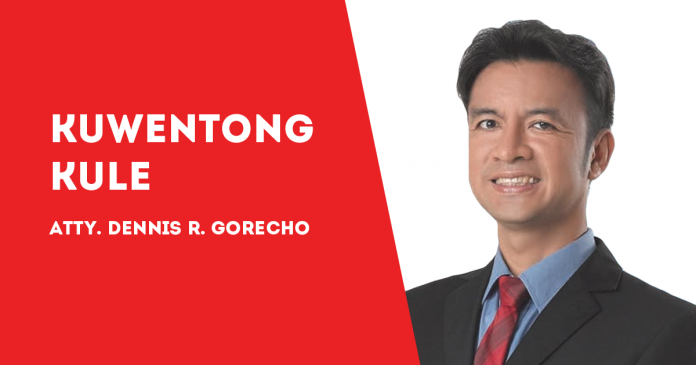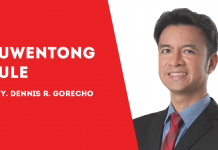
IT WAS 1:30 a.m., April 6, 1999, a Tuesday. A friend sent a message via my beeper. It read: “Dennis, congrats! You are now officially Atty. Gorecho.”
I was among the lucky 1,465 examinees who passed, or 39.63 percent out of the 3,697 examinees of the 1998 bar exams. It was considered one of the highest passing rates in bar exam history.
The exams are grouped into eight legal areas: political, labor, criminal, commercial, taxation, civil, remedial, and legal ethics and forms.
One has to gain an average of 75 percent with no subject falling below 50 percent otherwise he will be disqualified.
I failed in my Political law but my final grade was pulled up by my score in Remedial law which was my highest.
The bar exam is considered one of the toughest among the professional board exams, having one of the highest mortality rates. Passing is obviously not that easy. The discipline in terms of time management and patience is crucial during the review period.
It is also a yearly spectacle on the performance of law schools measured on the most number of topnotchers or scoring the highest passing rate.
The 1998 bar topnotchers included one from the Baguio Colleges Foundation ( now University of the Cordilleras) as the first placer, three from my alma mater the University of the Philippine (2nd, 3rd and 5th ), University of Sto. Thomas (4th), Ateneo de Manila (6th,7th ,9th, and 10th ), and University of San Carlos (8th ).
I belonged to the working student program of UP Law as a reporter for the TODAY broadsheet and other international news agencies. I do my coverage during the day then attend my evening classes. I read my cases in the bus on the way home to Las Piñas from Diliman, always looking for the seat with the strongest head light.
Former Solicitor General Florin Hilbay was my bar exam buddy who topped the following year’s bar exam with one of the lowest passing rate (16.59 percent), with three UP Law again in the top 10.
I jokingly tell friends that he became a topnotcher because of my reviewers he borrowed.
Ultimately, being a good lawyer is another thing. Passing the bar is not enough.
There were those who joined law offices for private practice while others joined the government, judiciary, politics or the academe.
I am now connected with a law firm specializing in intellectual property law and seafarers’ rights, among others.
And there’s alternative lawyering. It is a legal practice either individually or through legal resource organizations that work with the poor and marginalized groups, identities and communities towards their empowerment, greater access to justice, and building peace.
Many alternative lawyers are guided by the words of former President Ramon Magsaysay: “Those who have less in life should have more in law.”
Twenty-two year later, the Supreme Court issued a statement on the killings and threats against judges and lawyers, saying that such actions are “no less than an assault on the Judiciary.”
The statement was released in response to the petition filed by the Free Legal Action Group (FLAG) on the continued attacks on the legal profession citing at least 61 law practitioners killed since 2016 under the Duterte administration.
With such number higher than all the recorded deadly attacks on lawyers in the last 50 years under six previous presidents, FLAG asserted that this is an indicator of the growing danger of practicing the legal profession in the country. I used to be a FLAG volunteer myself.
Many other lawyers have been red-tagged and others surveilled, including some counsels appearing before the Supreme Court in the consolidated cases challenging the Anti-Terror Law of 2020. Some of the human rights advocates and defenders were eventually physically attacked and assaulted.
Critics argued that with Duterte being so “vocal” in expressing his disdain for human rights, it sends “a chilling message” that anyone who demands that their rights be protected “is now considered an enemy of the state”.
The Supreme Court stressed that “to assault the Judiciary is to shake the very bedrock on which the rule of law stands. This cannot be allowed in a civilized society like ours. This cannot go un-denounced on the Court’s watch.”
“In this light, the Court condemns in the strongest sense every instance where a lawyer is threatened or killed, and where a judge is threatened and unfairly labeled. We do not and will not tolerate such acts that only perverse justice, defeat the rule of law, undermine the most basic of constitutional principles, and speculate on the worth of human lives,” the Supreme Court said.
***
“Kule” is the moniker of Philippine Collegian, the official student publication of UP Diliman. Atty. Dennis R. Gorecho heads the seafarers’ division of the Sapalo Velez Bundang Bulilan law offices. For comments, email info@sapalovelez.com, or call 09175025808 or 09088665786./PN

